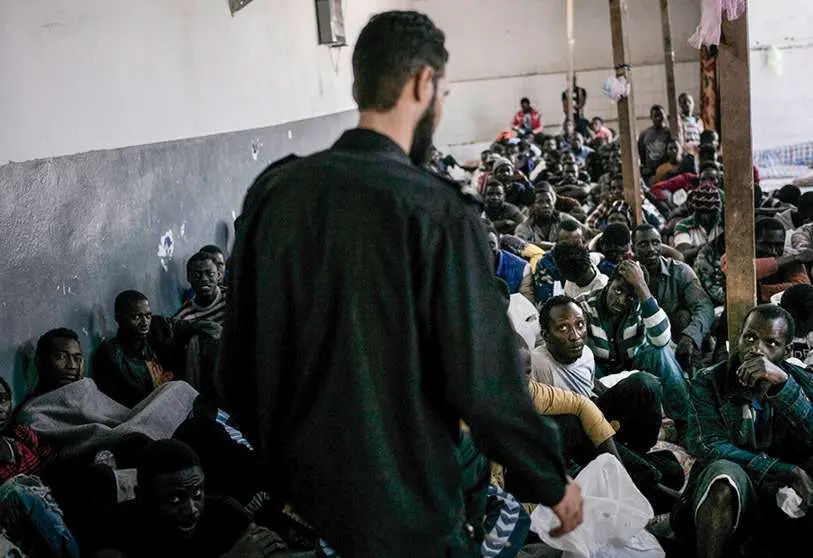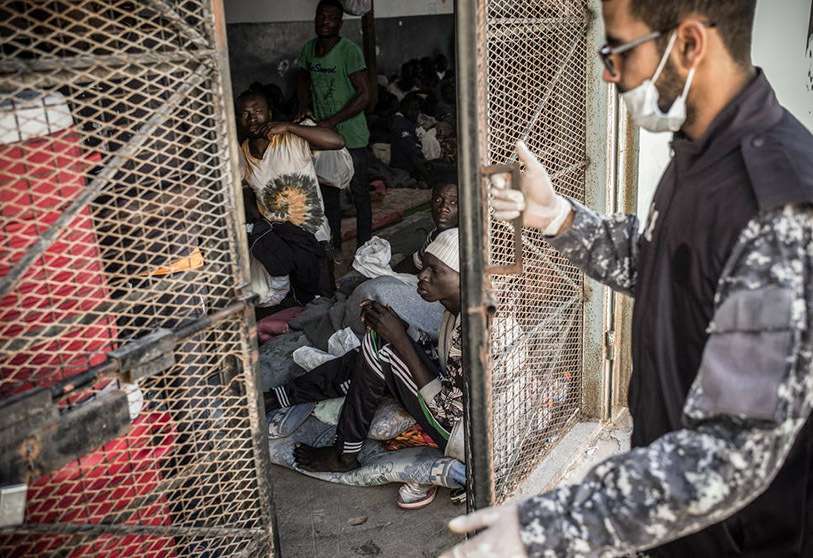Continued violence against refugees and migrants forces Doctors Without Borders to suspend activities in Libya

Following repeated acts of violence against refugees and migrants held in two detention centres in Tripoli, Doctors Without Borders (MSF) has announced that it is forced to temporarily suspend its activities in the Mabani and Abu Salim detention centres.
Since February, cases of mistreatment, physical abuse and violence against detainees held in these detention centres have steadily increased. MSF has reported that in just one week, its teams have witnessed at first hand and received reports of at least three violent events that have caused serious physical and psychological harm.
"This is not an easy decision to make, as it means we will not be present in detention centres where we know people are suffering on a daily basis," acknowledges Beatrice Lau, MSF's general coordinator in Libya. "However, the persistent pattern of violent incidents and serious harm to refugees and migrants, as well as the risk to the safety of our staff, has reached an unacceptable level. Until violence ceases and conditions improve, MSF cannot continue to provide humanitarian and medical care in these facilities.
During a visit on 17 June to the Mabani 'Collect and Return' detention centre, where at least 2,000 people are estimated to be held in overcrowded cells, MSF teams witnessed acts of violence carried out by guards, including indiscriminate beatings of people attempting to leave their cells for medical consultations by medical staff.
MSF notes that its team received reports of rising tensions the night before, tensions that culminated in massive violence that left both migrants and refugees and guards injured. MSF treated 19 patients for injuries caused by blows, including fractures, cuts, abrasions and trauma. One unaccompanied migrant child was left unable to walk after suffering severe ankle injuries. Others reported being physically and verbally abused by guards, according to MSF.
Earlier the same week, on 13 June, automatic weapons were fired at people held in Abu Salim detention centre, causing multiple casualties, according to reports received by MSF teams. For seven days following the incident, MSF teams were denied access to the detention centre, raising concerns about the impact of the lack of treatment for those with potentially serious injuries and for the critically ill, the organisation said.
The increase in violence since the beginning of the year is accompanied by a significant increase in the number of refugees, migrants and asylum seekers intercepted at sea by the EU-funded Libyan coastguard. These people are forcibly returned to Libya and held in detention centres. As of 19 June, more than 14,000 people have been intercepted and returned to Libya, more than in the whole of 2020.

This has resulted in severe overcrowding of the centres and a deterioration of the already deplorable conditions of these facilities. Most detention centres lack ventilation and natural light; some are so overcrowded that up to four people share one square metre of space, forcing people to take turns lying down and sleeping. Those held in the centres lack constant access to clean water and sanitary facilities.
In addition, migrants and refugees do not receive enough food. They are barely able to eat one or two small meals a day, usually a small piece of bread and cheese or a plate of macaroni that they have to share among many. MSF health staff have observed that, in the absence of food, people sometimes use medication to control their hunger. The lack of sufficient nutritious food has meant that some women are unable to produce breast milk to feed their babies. One woman told MSF teams that she was so desperate to feed her five-day-old baby that she tried to give her baby her ration of solid food so that he would not starve to death. In these inhumane conditions, tensions often lead to outbreaks of violence between guards and those arbitrarily detained in the centres.
MSF calls for an end to the violence and an improvement in conditions for refugees and migrants trapped in the Mabani and Abu Salim detention centres. MSF also reiterates its call for an end to the long-standing practice of arbitrary detention in Libya, and for the immediate evacuation of refugees, asylum seekers and migrants exposed to life-threatening risks from the country.
"Our colleagues have seen and heard of vulnerable men, women and children, already held in desperate conditions, being subjected to further abuse and life-threatening situations," says Ellen van der Velden, MSF's director of operations. "No more people intercepted at sea by the EU-funded Libyan coastguard must be forced to return to Libya and detention centres. The violence in the centres must end and all people trapped in these inhumane conditions must be released."
MSF has been working in detention centres in Libya since 2016, providing primary healthcare and psychosocial support to detainees. MSF teams also identify vulnerable people and refer patients requiring specialised care to hospitals in Libya.
In Zuwara, MSF provides medical, psychosocial and protection services to refugee and migrant communities. In Bani Walid, teams provide general medical care and medical referrals to refugees and migrants who have escaped from captivity, as well as to victims of torture and trafficking. MSF also provides technical support to Libya's National Tuberculosis Programme, run by the National Centre for Disease Control, and manages a tuberculosis care project in Misrata.
In the first half of 2021, MSF teams working in detention centres in Tripoli provided medical care to 8,920 people, carried out 9,248 medical consultations and arranged referrals for 405 patients to hospitals in the city








